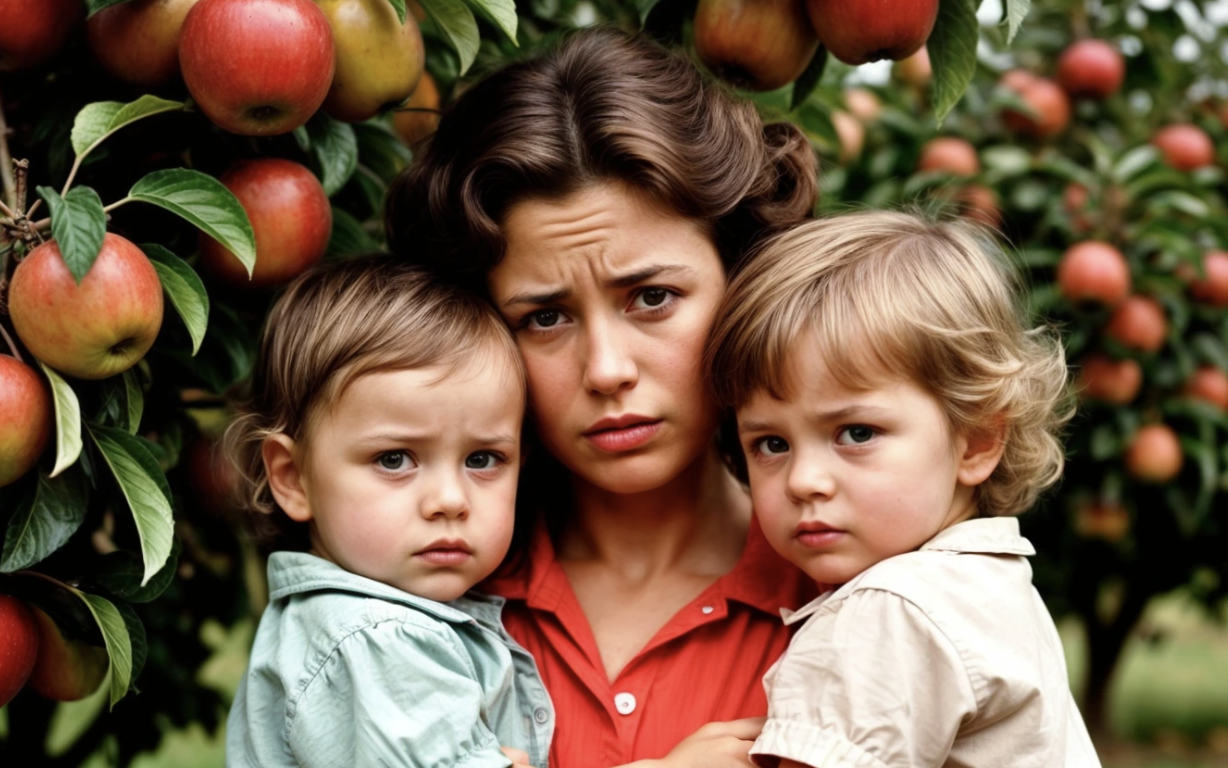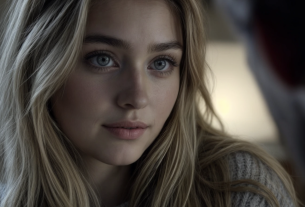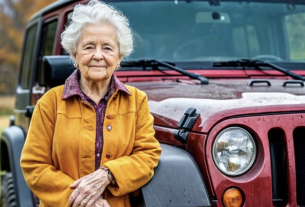“Marish, come quickly!” Stepan shouted from the garden, and I dropped the half-mixed dough right into the sourdough starter.
I rushed out onto the porch — my husband was standing by the old apple tree. And next to him… two small children: a boy and a girl. They were sitting in the grass between the carrot beds, dirty, wearing torn clothes, with big frightened eyes.
“Where did they come from?” I whispered, stepping closer.
The girl reached out to me with her hands. The boy pressed close to her but didn’t look scared. They were about two years old, maybe a little older.
“I don’t understand myself,” Stepan scratched the back of his head. “I went to water the cabbage, and there they were. Like they grew out of the ground.”
I crouched down. The girl immediately wrapped her arms around my neck, pressing her cheek to my shoulder. She smelled of earth and something sourish. The boy stayed in place but didn’t take his eyes off me.
“What are your names?” I asked softly.
There was no answer. Only the girl hugged me tighter and started to snuffle.
“We need to notify the village council,” Stepan said. “Or the local policeman.”
“Wait,” I said, stroking the child’s tousled hair. “First, let’s feed them. Look how skinny they are.”
I led the girl inside; the boy cautiously followed, holding the edge of my dress. In the kitchen, I sat them both at the table, poured some milk, and cut bread with butter. The children ate greedily, as if they hadn’t eaten for days.
“Maybe gypsies dropped them off?” Stepan suggested, watching them.
“No, I don’t think so,” I shook my head. “Gypsy children usually have darker skin. These two are fair-eyed and blonde.”
After eating, the kids perked up. The boy even smiled when I gave him a second piece of bread. The girl climbed onto my lap and fell asleep, clutching my sweater tightly.
In the evening, the local policeman Petrovich arrived. He examined the kids and wrote something in his notebook.
“Spread them out among the villages,” he promised. “Maybe someone lost them. For now, let them stay with you. There’s no room at the reception center in the district.”
“We don’t mind,” I said quickly, holding the sleeping girl close.
Stepan nodded. We’d been married a year, but still had no children of our own. And now — two at once.
That night, we set them up in our room — on the floor by the stove. The boy couldn’t fall asleep for a long time, watching me closely. I reached out my hand, and he timidly took my finger.
“Don’t be afraid,” I whispered. “You’re not alone anymore.”
In the morning, a gentle touch woke me. I opened my eyes — the girl was standing beside me, carefully stroking my cheek.
“Mama…” she said uncertainly.
My heart stopped. I lifted her up and held her to my chest.
“Yes, dear. Mama.”
Fifteen years passed like a blink. We named the girl Alyonka — she grew into a slender beauty with long golden hair and eyes the color of spring sky. Misha became a strong young man, just like his father.
Both helped with the farm, did well in school, and became everything to us.
“Mama, I want to go to the city university,” Alyonka declared at dinner. “To become a pediatrician.”
“And I want to study at the agricultural academy,” Misha added. “Dad, you said it’s time to develop the farm.”
Stepan smiled and ruffled his son’s shoulder. We never had biological children, but never regretted it — these two became ours truly.
Back then, Petrovich found no one. We formalized guardianship, then adoption. The children always knew the truth — we hid nothing from them. But to them, we were real mom and dad.
“Remember when I baked pies for the first time?” Alyonka laughed. “I dropped all the dough on the floor.”
“And you, Misha, were afraid to milk the cows,” Stepan teased. “You said they’d eat you.”
We laughed, interrupting each other with memories. So many moments over the years! The first school day when Alyonka cried and didn’t want to let me go. Misha’s fight with bullies who called him a foster kid. And the talk with the principal after which it all stopped.
After the kids went to bed, Stepan and I sat on the porch.
“They’ve grown up good,” he said, hugging me.
“My own,” I nodded.
The next day everything changed. A foreign car pulled up to the gate. Out came a man and a woman about forty-five, neatly dressed, businesslike.
“Hello,” the woman smiled, but her eyes were cold. “We’re looking for our children. Fifteen years ago they disappeared. Twins — a girl and a boy.”
It was like being doused with ice water. Stepan came out behind me and stood beside me.
“And what brings you here?” he asked calmly.
“We were told you took them in,” the man pulled out a folder of papers. “Here are the documents. These are our children.”
I looked at the dates — they matched. But my heart didn’t believe.
“You stayed silent for fifteen years,” I said quietly. “Where were you?”
“We searched, of course!” the woman sighed. “It was a difficult time. The children were with a nanny, and she took them away. On the way, she had an accident… The children disappeared. Only now did we manage to find a lead.”
At that moment Alyonka and Misha came out of the house. Seeing strangers, they froze and looked questioningly at us.
“Mama, what’s happening?” Alyonka took my hand.
The woman gasped, covered her mouth with her palm.
“Katya! It’s you! And this is Artyom!”
The children exchanged looks, clearly not understanding what was going on.
“We are your parents,” the man blurted. “We came home.”
“Home?” Alyonka’s voice trembled. She squeezed my hand tighter. “We are already home.”
“Oh, come on,” the woman stepped forward. “We are your blood family. We have a house near Moscow, and can help with the farm. Family is always better than strangers.”
There it was. I felt anger boiling inside.
“You didn’t look for them for fifteen years,” I hissed. “And now, when they’re grown, able to work — suddenly you appear?”
“We filed a police report!” the man began.
“Show me,” Stepan held out his hand. The man pulled out some certificate, but Stepan noticed the date — a month ago.
“That’s a fake,” he said. “Where is the original?”
The man faltered, putting the papers away.
“You didn’t look for them,” Misha suddenly intervened sharply. “Petrovich checked. There were no reports.”
“Shut up, kid!” the man snapped. “Get ready, you’re coming with us!”
“We’re not going anywhere,” Alyonka stood beside me. “These are our parents. Real ones.”
The woman’s face flushed. She pulled out her phone.
“I’m calling the police now. We have documents, blood is thicker than papers.”
“Call them,” Stepan nodded. “But don’t forget to invite Petrovich. He’s kept all records for fifteen years.”
An hour later, our yard was full of people. The local policeman, a district investigator, even the head of the village council came. Alyonka and Misha sat at home; I was near them — holding them as best I could.
“We won’t give you away,” I whispered, holding the children close. “No matter what. Don’t be afraid.”
“We’re not afraid anyway, Mom,” Misha clenched his fists. “Let them just try.”
Stepan came into the room. His face was grim.
“Fake,” he said shortly. “The documents are forged. The investigator immediately noticed inconsistencies. Dates don’t match. When the children came to us, those ‘parents’ were in Sochi — tickets and photos prove it.”
“Why would they do that?” Alyonka asked.
“Petrovich figured it out. They have a farm but are in debt. Workers ran away — no money to pay. They decided to find free labor. Heard about you somehow — and forged everything.”
We went out into the yard. The man was already being put into a police car. The woman yelled, demanding a lawyer, a trial.
“They’re our children! You’re hiding them!”
Alyonka approached her and looked straight in her eyes:
“I found my parents fifteen years ago. They raised me, loved me, never abandoned me. And you are strangers who wanted to use us.”
The woman stepped back as if struck.
When the cars left, we were alone — the four of us. Neighbors dispersed, whispering and discussing what had happened.
“Mom, Dad… thank you for not giving them away,” Misha hugged us.
“Silly boy,” I stroked his hair. “How could we? You’re our children.”
Alyonka smiled through tears:
“You know, I often thought: what if my real parents were found? Now I know. Nothing would have changed. My real parents are here.”
That evening, we gathered at the table — like fifteen years ago, only now the children were grown. But the love remained the same — alive, warm, and familial.
“Mom, tell us again how you found us,” Alyonka asked.
I smiled and began the story again — about two little ones in the garden, how they entered our home and hearts, how we became a family.
“Grandma, look what I drew!” three-year-old Vanyushka held out a sheet with colorful scribbles.
“Lovely!” I picked up my grandson. “Is this our house?”
“Yeah! And that’s you, Grandpa, Mom and Dad, Aunt Alyona and Uncle Seryozha!”
Alyonka came out of the kitchen — now a doctor at the district hospital. Her belly rounded; she was expecting her second child.
“Mom, Misha called, they and Katya will be here soon. Did you manage to bake the pies?”
“Of course,” I nodded. “Apple ones, your favorite.”
Years flew by unnoticed. Alyonka graduated, returned home — saying city life was cramped, but here was air, peace, and home. She married our tractor driver Seryozha — a reliable guy.
Misha finished agricultural college and now runs the farm with Stepan. They’ve tripled its size. He married a teacher, Katya; they already have little Vanya.
“Grandpa!” the grandson slipped from my arms and ran to the yard.
Stepan just returned from the field. His hair was graying but he stood strong as an oak. He scooped up Vanya and spun him around.
“Well, Vanya, what will you be when you grow up?”
“A tractor driver! Like Dad and you!”
Alyonka and I exchanged smiles and laughed. History repeats.
Misha’s car pulled up. Katya jumped out first, carrying a pot.
“Brought borscht, your favorite!”
“Thanks, dear.”
“And we brought news!” she blurted happily.
“What news?” I asked cautiously.
“We’re having twins!” Katya beamed.
Alyonka hugged them, Stepan’s face spread into a satisfied smile.
“So that’s family for you! The house will be completely full!”
At dinner, everyone gathered around the large table Stepan and Misha made a couple of years ago. There was enough room for all.
“Remember that story?” Misha said thoughtfully. “About the fake parents who filed that claim?”
“How could I forget,” Alyonka smiled. “Petrovich still tells that story as an example to the young.”
“And I thought then: what if they really were my real parents? What if I had to leave?” Misha continued. “And I realized: even if they were real, I would have stayed. Because family is not blood. It’s all this,” he gestured around the table.
“Don’t get your wife all emotional now,” Stepan grumbled, but his eyes twinkled.
“Uncle Misha, tell me again how you and Aunt Alyonka were found!” Vanyushka requested.
“Again?!” Katya laughed. “He’s heard it a hundred times already!”
“Well, tell me!” the kid insisted.
Misha began the story. I sat watching my children, daughters-in-law, grandson. Stepan, who year by year grew even dearer to me.
Once I thought I couldn’t have children. But life gave me such a gift — found two just like that, in the garden, between the beds. And now our house is filled again with laughter, voices, life.
“Grandma, when I grow up, will I find someone in the garden too?” Vanyushka asked.
We all laughed.
“Maybe you will,” I patted his head. “Life is full of miracles. The main thing is to keep your heart open. Then love will find you itself.”
The sun was setting behind the horizons, painting the old apple tree in pink tones — the very tree where it all began. It grew, just like we did. Like our family.
And I knew one thing: this is not the end. Ahead are many happy days, new smiles, new stories. A real family — alive, growing. And its roots are where love is.



